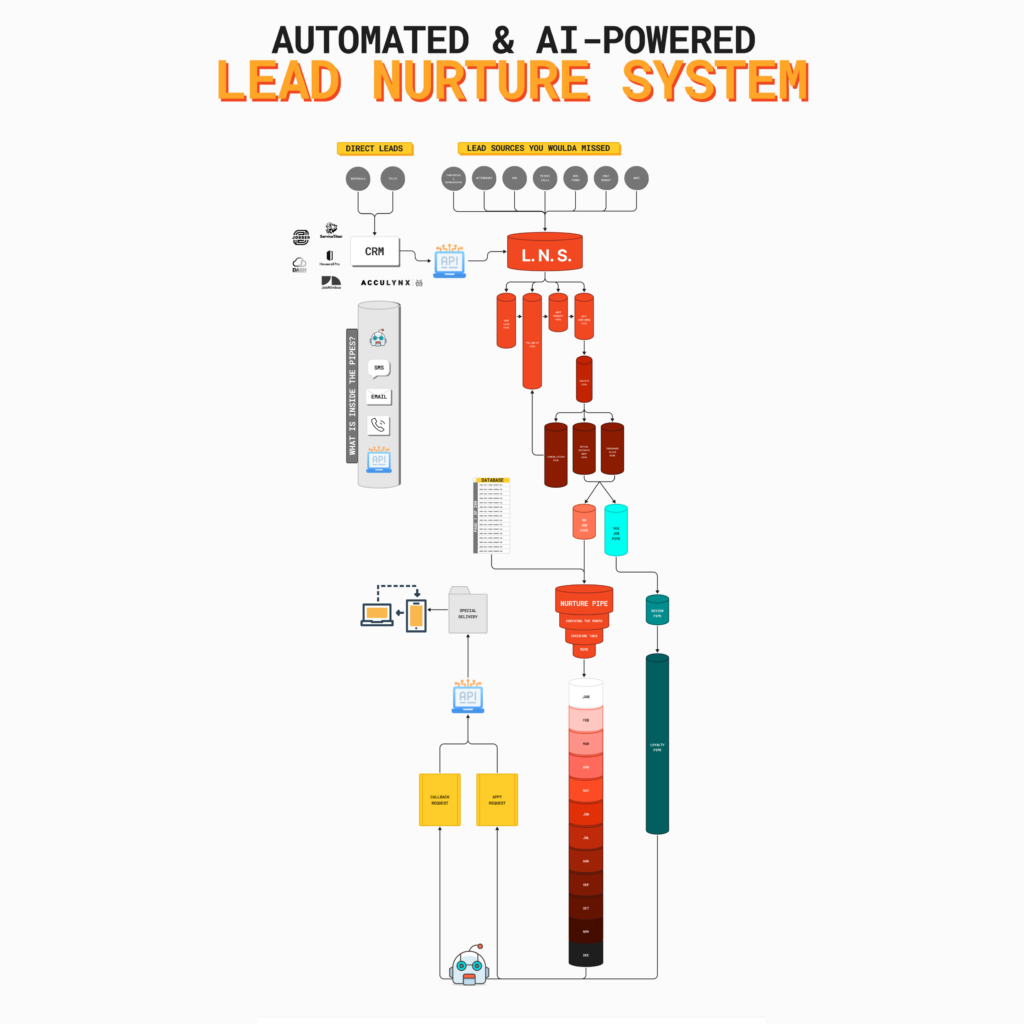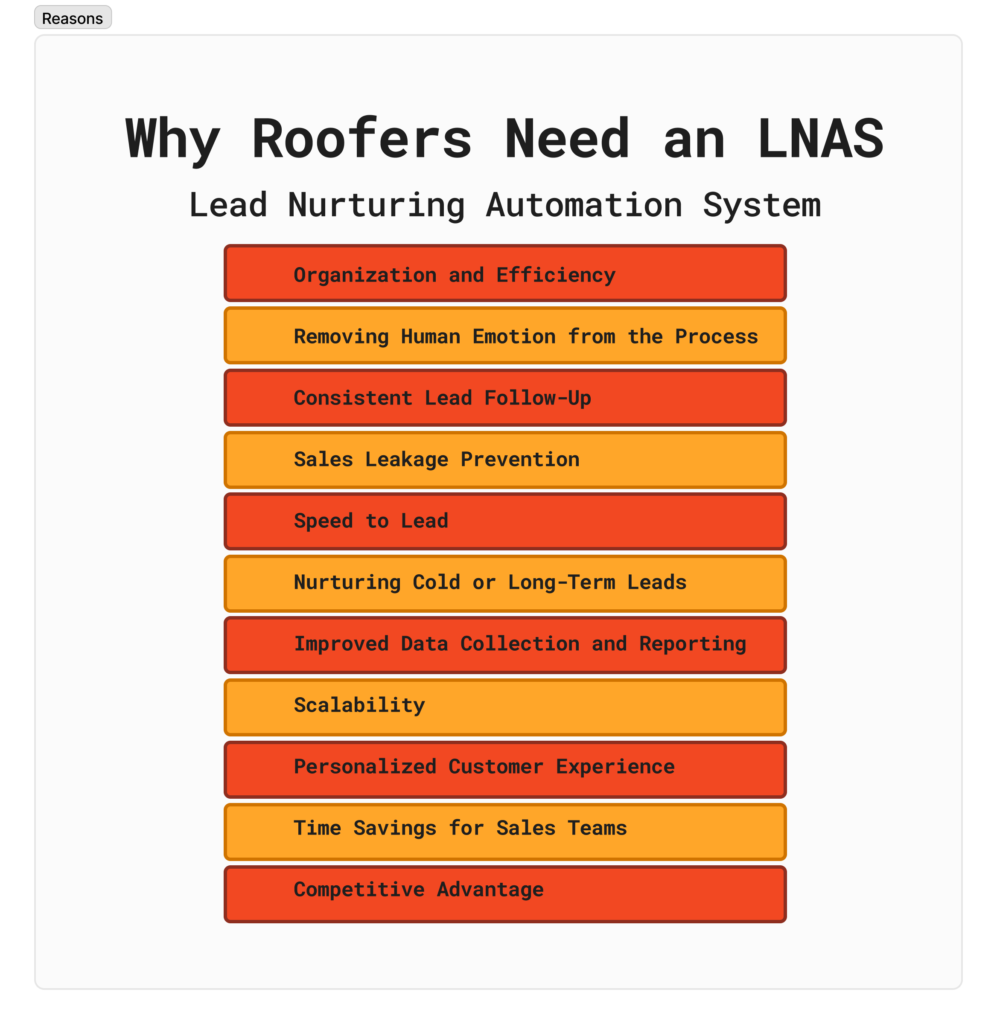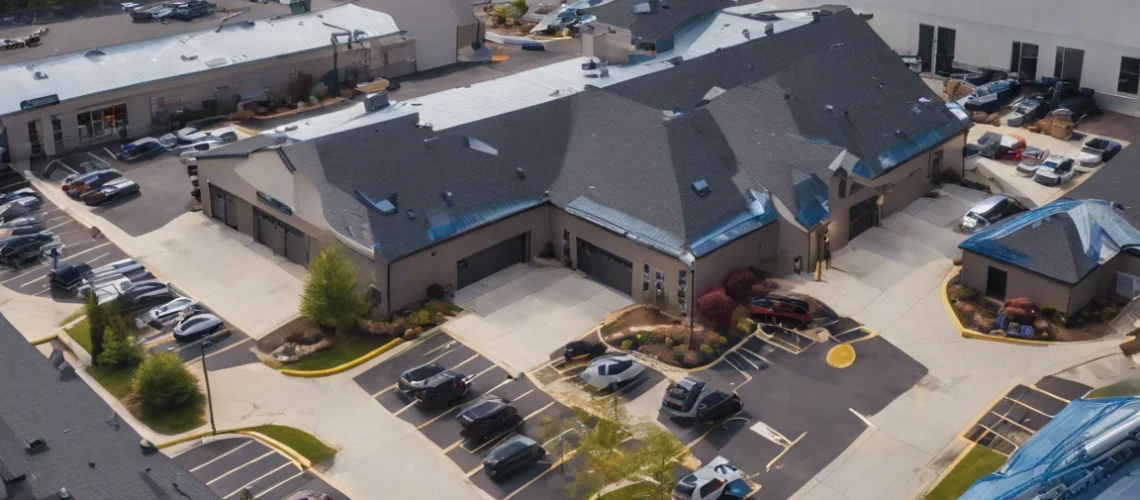
The ability to manage leads effectively can make or break a roofing business. Acculynx, Jobber and Job Nimbus do a fantastic (some would say) job of managing production… but lead nurturing? Not so much.
This is where an LNAS lead management automation system comes in—a powerful solution that removes human error, speeds up response times, and keeps your sales pipeline flowing seamlessly.
By automating lead management, roofing companies prevent lost opportunities and can focus on what truly matters.
Here are some of the direct benefits:
1. Organization and Efficiency
While platforms like AccuLynx, JobNimbus, and Jobber are excellent for managing production tasks in the roofing industry—such as job scheduling, project management, and invoicing—they are not designed for lead management or sales nurturing. These systems excel at tracking the progress of jobs once they are in production, but they don’t focus on capturing leads, automating follow-ups, or nurturing potential clients through the sales funnel.
For true lead management and sales nurturing, roofing companies need to implement dedicated CRM tools or marketing automation systems that ensure every lead is tracked, followed up on, and moved through a structured sales process—areas where these production-focused platforms fall short. Solutions that automate lead nurturing ensure that potential clients are engaged consistently, helping to maximize conversion rates and grow the sales pipeline.
2. Removing Human Emotion from the Process
In sales, human emotion can often lead to inconsistent follow-ups and missed opportunities. Roofing companies that rely on manual processes for lead management are vulnerable to these fluctuations—salespeople may prioritize certain leads based on gut feeling, mood, or even perceived difficulty, allowing others to slip through the cracks. By automating lead management and sales nurturing, companies can eliminate emotional biases, ensuring every lead is given the same level of attention and follow-up.
Automation creates a system where follow-ups are scheduled automatically, reminders are triggered consistently, and no leads are left unattended due to personal preferences or distractions. This results in a more efficient, predictable sales process, improving overall conversion rates while freeing up sales teams to focus on high-value tasks.
3. Consistent Lead Follow-Up
One of the biggest challenges roofing companies face is ensuring consistent follow-up with potential clients. Manual follow-up processes are often inconsistent—sales teams may get overwhelmed, forget to reach out, or prioritize certain leads over others, leading to missed opportunities and lost revenue.
With automated lead management, every lead is systematically followed up on, regardless of volume or the salesperson’s workload. Automated systems send out timely reminders, follow-up emails, or text messages at scheduled intervals, ensuring that no lead is neglected.
This not only improves the chances of closing deals, but also enhances the customer experience by maintaining consistent communication. Roofing companies can focus on high-quality leads while automation handles repetitive follow-up tasks, ultimately driving better results and higher conversion rates.

4. Sales Leakage Prevention
Sales leakage is a major issue for roofing companies, where potential leads slip through the cracks due to inefficient follow-up processes or missed opportunities. This often happens when leads are manually tracked, leaving room for human error, delays, or oversight. Even the most skilled sales teams can lose track of leads, especially during busy seasons or when juggling multiple projects.
Automating lead management helps prevent sales leakage by ensuring that every lead is followed up on consistently, no matter how busy the sales team gets. Automation tools can send reminders, trigger follow-up emails, and even prompt sales reps when it’s time to reach out again. This creates a systematic approach to managing leads, ensuring no opportunity is forgotten.
With automation in place, roofing companies can significantly reduce lead drop-off and ensure that potential clients are continuously nurtured until they are ready to close. By streamlining the sales process and eliminating the risk of manual errors, companies can capture more leads and prevent revenue from slipping away.
5. Speed to Lead
In the roofing industry, speed to lead—the time it takes to respond to a new inquiry—plays a crucial role in closing deals. Studies have shown that the quicker a business responds to a lead, the more likely they are to convert that lead into a customer. However, speed to lead is not only important for responding to new leads; it also plays a significant role in estimate follow-ups and annual nurturing. Roofing companies that are slow to follow up on estimates or maintain consistent annual check-ins with existing customers risk losing business to competitors with faster response times.
By automating lead management, roofing companies can ensure immediate engagement at every stage of the customer journey. Automation systems can trigger instant responses, such as follow-up emails for estimates, texts for status updates, or reminders for annual service offers. This keeps your business top of mind and ensures that no opportunity is lost due to delayed responses.
In industries where customers often go with the first company to respond, reducing response times across all interactions—whether it’s a new inquiry, an estimate follow-up, or a yearly check-in—can give your company a substantial competitive edge. Automation guarantees that all leads and customers receive timely follow-ups, leading to higher conversion rates and long-term client retention.
6. Nurturing Cold or Long-Term Leads
Not all leads are ready to convert immediately, especially in the roofing industry where decisions often involve significant investments. Cold leads or long-term prospects may take months, or even years, before they’re ready to move forward with a project. Without a consistent nurturing strategy, these potential clients can slip away and go to competitors.
Automation plays a critical role in nurturing these long-term leads by maintaining consistent communication without the need for manual effort. Automated systems can send drip email campaigns, seasonal offers, and personalized check-ins at regular intervals, keeping your business top of mind even when the lead isn’t ready to make a decision yet. These nurturing strategies can involve sending valuable content like roofing maintenance tips, reminders for annual inspections, or exclusive discounts, creating a relationship built on trust and engagement.
By nurturing cold or long-term leads, roofing companies can significantly increase their chances of converting these prospects when they’re ready to move forward. Instead of letting leads go cold, automation ensures that you’re consistently building a relationship, so when they do need your services, your company is the first they think of. Long-term nurturing also helps roofing businesses maintain a steady pipeline of future clients, preventing gaps in sales and sustaining growth over time.
7. Improved Data Collection and Reporting
One of the key advantages of automating lead management for roofing companies is the ability to collect and analyze data more effectively. Manual lead tracking often leads to incomplete data, missed opportunities, or poor reporting, making it difficult to identify patterns and optimize your sales process. Automation systems, on the other hand, ensure that every interaction is logged, every lead is tracked, and all activities are recorded in a structured and consistent manner.
Automated systems provide real-time data collection on key metrics such as lead source, response times, follow-up efficiency, conversion rates, and customer engagement. This data allows roofing companies to generate detailed reports, offering valuable insights into sales performance and identifying bottlenecks in the pipeline.
By leveraging automated data reporting, roofing businesses can:
•Identify top-performing lead sources, enabling better allocation of marketing budgets.
•Track the effectiveness of follow-up strategies and adjust timing or messaging to improve conversions.
•Analyze long-term trends, such as which seasons see the highest lead conversion rates.
•Understand customer behavior, including how long it takes for a lead to convert and the typical customer journey from initial inquiry to final sale.
With data-driven insights, roofing companies can make more informed decisions, optimize their processes, and improve overall sales performance. This level of data visibility is difficult to achieve through manual systems and can be a game changer for companies looking to scale and grow.
8. Scalability
As roofing companies grow, managing an increasing volume of leads and customer interactions becomes a major challenge. Manually handling these tasks can lead to bottlenecks, missed opportunities, and an overwhelming workload for sales teams. Automation offers a scalable solution, enabling roofing companies to efficiently manage large volumes of leads without sacrificing quality or consistency.
With automation, businesses can:
•Handle a higher volume of inquiries with the same team size, as repetitive tasks like follow-ups and data entry are automated.
•Ensure that every lead is nurtured and followed up on, regardless of how many leads are coming in.
•Streamline processes, from lead capture to closing deals, allowing for seamless scaling of operations without increasing manual effort.
•Easily manage seasonal spikes in demand, such as after a storm or during peak roofing seasons, without missing out on potential business due to human capacity limits.
Automation also makes it easy to adjust as your business grows—adding new regions, sales teams, or marketing campaigns can be done with a few clicks, ensuring that the lead management system can scale alongside your company. By creating a system that’s capable of handling growth efficiently, roofing businesses can focus on scaling their operations without worrying about overwhelming their sales teams.
9. Personalized Customer Experience
In the roofing industry, personalization plays a crucial role in building trust and standing out from competitors. Customers expect businesses to understand their needs and provide tailored solutions. Automation can significantly enhance the customer experience by delivering personalized communication and interaction at scale.
With automation, roofing companies can:
•Personalize follow-up emails and messages using customer data, such as addressing the client by name, referencing their specific roofing concerns, or highlighting the service they inquired about. This creates a more engaging and personal interaction, even though the process is automated.
•Use dynamic content to deliver personalized offers or suggestions based on the customer’s past interactions, location, or the type of roofing service they need. For example, a client who previously requested a repair estimate might receive automated updates about seasonal maintenance deals.
•Tailor the customer journey by automating different communication workflows based on where the client is in the sales process—whether it’s a new lead, a follow-up after an estimate, or a yearly maintenance reminder.
•Implement customized check-ins and follow-ups for repeat customers, ensuring they feel valued and that their needs are consistently addressed. Automated systems can remember key details like service history and use them to craft relevant communication.
By providing a personalized experience, roofing companies can build stronger relationships with customers, leading to higher satisfaction, increased loyalty, and a better chance of repeat business. Automation allows this level of tailored
10. Time Savings for Sales Teams
One of the greatest benefits of automation for roofing companies is the significant time savings it provides to sales teams. Manual tasks such as lead follow-ups, data entry, appointment scheduling, and customer outreach consume valuable time that could be better spent on high-value activities, such as closing deals and building client relationships.
Automation streamlines repetitive tasks, allowing sales teams to:
•Automatically follow up with leads through scheduled emails or texts, ensuring consistent communication without the need for manual reminders.
•Schedule appointments automatically, reducing the back-and-forth with potential clients and freeing up time for sales reps to focus on nurturing high-potential leads.
•Eliminate manual data entry, as leads are automatically captured, tracked, and updated in the CRM or lead management system.
•Automate customer reminders for upcoming maintenance, inspections, or service renewals, keeping the sales pipeline active without added effort.
By taking over these repetitive tasks, automation frees up hours of administrative work, allowing salespeople to dedicate their energy toward personalized customer interactions, sales strategies, and business development. This improved efficiency not only boosts productivity but also contributes to higher sales performance and better customer satisfaction, as sales teams can focus on what they do best—building relationships and closing deals.
11. Competitive Advantage
In an industry as competitive as roofing, having a competitive advantage can make all the difference. Roofing companies that leverage automation for lead management, sales nurturing, and customer engagement gain a significant edge over those still relying on manual processes.
Here’s how automation provides that advantage:
•Faster response times: With automated systems, roofing companies can engage leads immediately, outperforming competitors who may take hours or even days to follow up. In a world where customers often choose the first company to respond, this quick engagement can dramatically increase conversion rates.
•Consistent communication: Automation ensures that no lead or client falls through the cracks. By maintaining consistent follow-ups, estimate reminders, and nurturing campaigns, companies can stay top-of-mind with potential customers—something manual systems can struggle with.
•Scalability: As roofing companies grow, manual processes can’t keep up with the increased workload. Automation allows companies to scale their lead management and customer follow-up without adding extra personnel, giving them the ability to handle more business with greater efficiency.
•Data-driven decision-making: Automated systems provide valuable data insights, allowing companies to refine their marketing and sales strategies. By identifying the best lead sources, optimizing follow-up timing, and improving customer targeting, companies can outperform competitors who lack these insights.
•Enhanced customer experience: Personalized and consistent communication improves customer satisfaction. By automating personalized messages and reminders, companies create a seamless experience that differentiates them from competitors who rely on sporadic, manual interactions.
By embracing automation, roofing companies can reduce human error, improve operational efficiency, and ultimately deliver a superior customer experience. This not only helps close more deals but also builds a strong brand reputation, positioning the company as a leader in the industry.
Summary
Roofing companies that automate their lead management systems gain significant advantages in organization, efficiency, and revenue growth. Automation helps ensure that no lead is overlooked, and every potential customer is consistently followed up with, reducing the risk of sales leakage. By removing human error and emotional biases from the sales process, roofing companies can focus on delivering timely, consistent follow-ups and personalized communications.
Key benefits include:
•Improved response times for new leads, estimate follow-ups, and annual check-ins, giving roofing companies a competitive edge.
•Consistent nurturing of cold or long-term leads, ensuring no opportunities are lost, even for leads that aren’t ready to convert right away.
•Data-driven insights and real-time reporting enable roofing businesses to track and optimize their lead management efforts.
•Automation supports scalability, allowing roofing companies to handle larger volumes of leads and clients as they grow.
•Personalized customer experiences at scale, enhancing satisfaction and increasing the likelihood of repeat business.
By adopting automation, roofing companies not only improve their sales processes but also gain a competitive advantage by being more responsive and efficient, ultimately driving higher conversion rates and revenue.
Discover how our automated system is designed specifically for roofing companies to streamline their lead management and sales processes.




